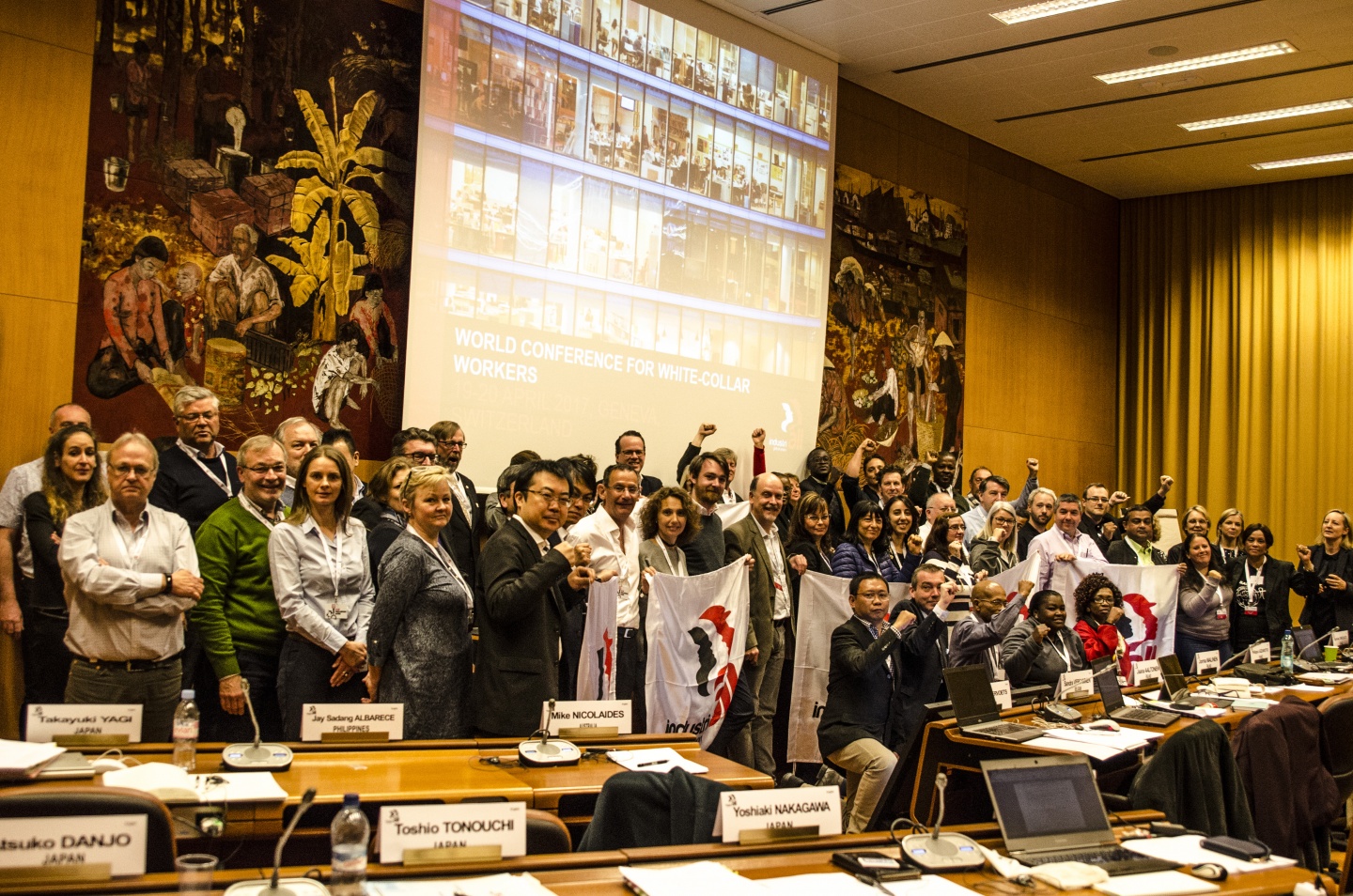20 April, 2017IndustriALL Global Union affiliates from 18 countries around the world met in Geneva, Switzerland, for the White-Collar World Conference on 19 and 20 April.
The 52 participants from 28 unions, including 22 women, recognized the importance of organizing white-collar workers as industry is becoming increasingly automated:
“Trade unions must meet the needs of all workers, especially as we go through digital transition,” said sector co-chair, Anne-Catherine Cudennec, from French metalworkers’ federation CFE-CGC.
“There are likely to be more and more white-collar workers. If we don't organize them in our unions, we won't succeed,” added co-chair Martin Linder, from Swedish union, Unionen.
Furthermore, technological transformation is blurring the differences between blue and white-collar workers. : “We don’t distinguish between blue and white-collar workers,” said Jay Albarece from ALU in the Philippines.
Issues that once affected largely blue-collar workers are now affecting white-collar workers, said Steve Kerr from British union, Unite:
“Historically, trade unions were more interested in blue-collar workers – and not in the professional engineers in my sector. That changed as blue-collar jobs went to low cost countries. Now we see professional jobs go to cheaper countries, such as Eastern Europe. Previously white-collar workers didn’t think they needed to be organized as unemployment wouldn’t affect them. Now it does.”
In some countries, white-collar workers are beginning to see the benefits of unionization themselves: “White-collar workers started to join the union when they saw it got better pay increases for blue-collar workers,” said Mohumad Reeaz Chuttoo, from the Chemical Manufacturing and Connected Trades Employees Union in Mauritius.
White-collar pressures
Several participants raised health and safety issues for white-collar workers. These include psychosocial challenges, burn-out, and fear of speaking out. In Japan, overtime is literally a matter of life and death. White-collar workers have worked such long hours they have taken their own lives or worked to the point of collapse.
Challenges
Conference participants raised the many challenges of organizing white-collar workers. Unions from both France and the UK highlighted the trend for human resource departments of multinational companies trying to take control of the workplace in a bid to oust unions.
Other problems included image problems for unions and the lack of structures in place to target white-collar workers. “We asked young white-collar workers why they hadn't joined a union,” said Martin Linder "‘No one ever asked me’ said most of them.”
Simon Eppel from the Southern African Clothing and Textile Workers’ union said: “We need sound industrial relations at every workplace regardless of whether the workers are white-collar or blue-collar. It could be the same union or different unions, but they need to cooperate. Everybody needs to be organized and work together.”
Unions shared examples of successful organizing and stressed the importance of meeting the needs of white-collar workers to increase membership. Grievance handling, legal assistance, and skilled wage negotiators are some of the incentives offered by ALU to white-collar workers in the Philippines.
“If we specialize what we offer to white-collar workers we can better organize them,” added Kerr.
Other trade unions in Finland, Germany and Belgium also told how they offer services and career advice to students - future white-collar workers - in a bid to attract membership. Participants agreed on the need for strong outreach to youth, women, and minorities.
Participants expressed a strong interest in emerging issues such as Industry 4.0, climate change, and Just Transition. There was also consensus on the need for good communications and networking within the white-collar sector.
Action plan
Participants gave suggestions for an IndustriALL action plan for the sector, which will be devised in alignment with IndustriALL’s five strategic goals. The plan will be considered and approved by the group in due course. The first step will be to carry out comprehensive mapping of white-collar workers on which to base action.
IndustriALL assistant general secretary, Atle Høie, said:
“The world conference has been a great new start for the white-collar section at IndustriALL. There have been some extremely useful presentations and enlightening discussions, and there is a real willingness for our affiliates to work together to organize. White-collar workers need unions as much as blue-collar workers - we are all part of the same global trade union movement.”










